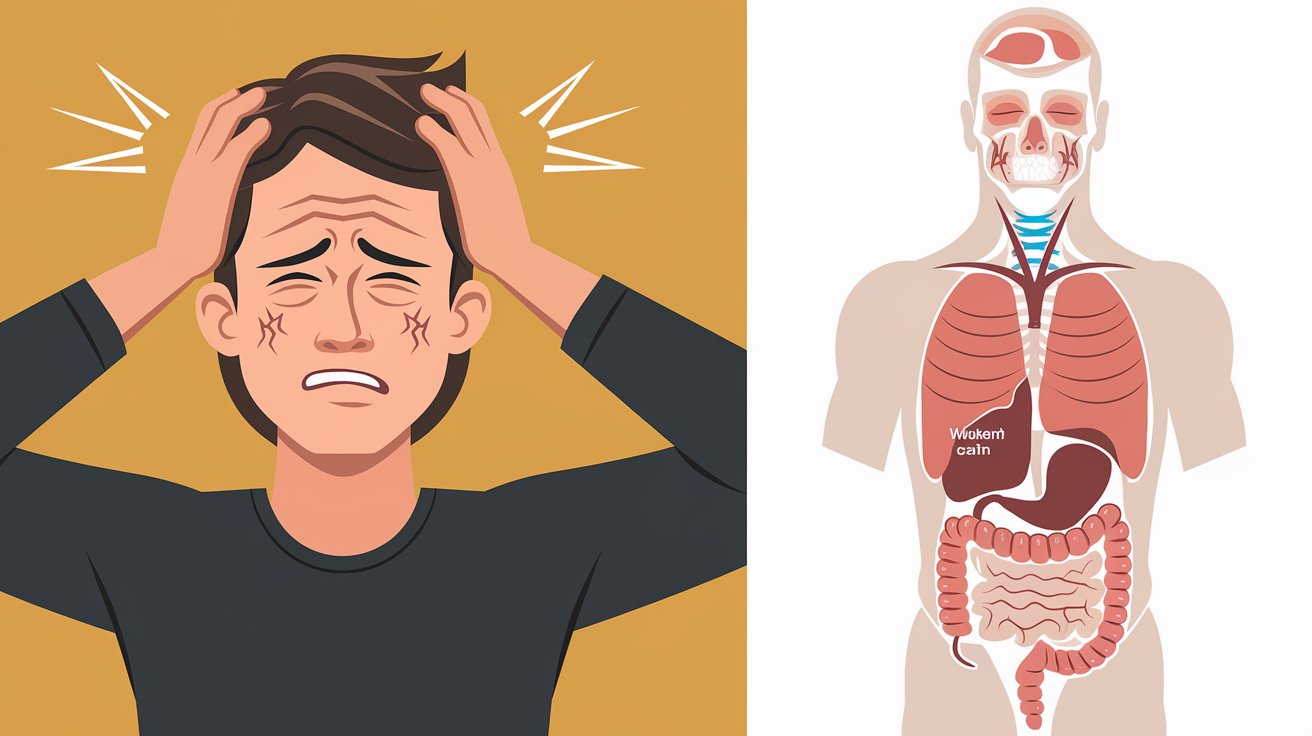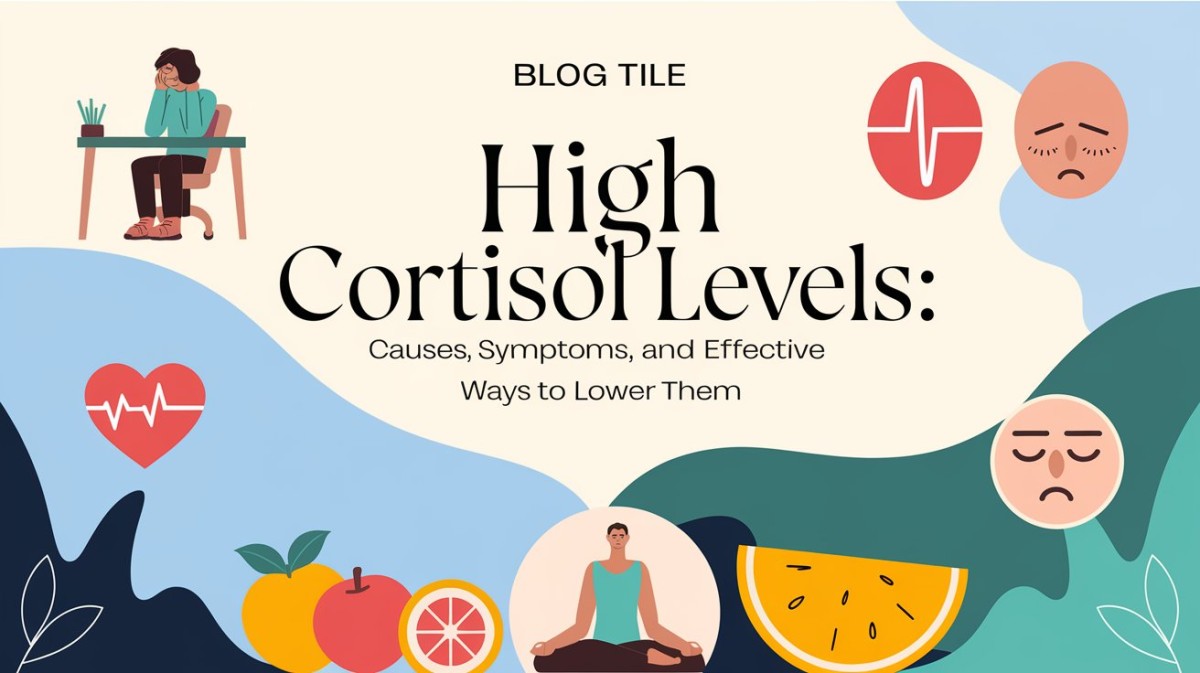Did it ever occur to you how many times a day you feel stressed, tired, or can’t focus? As far as cortisol levels are concerned, your body might actually be communicating to you. Affectionately referred to as the “stress hormone”, cortisol arguably is one of the most important hormones in your body but when its levels rise it is disastrous. This guide will take you through everything you need to know about high cortisol levels: the reasons, signs, and measures of taking control of it.
What is Cortisol?
Cortisol is a steroid hormone that comes from the adrenal glands which sit on top of your kidneys. It helps regulate vital functions like:
❖ Metabolism
❖ Memory formation
Such as when the pressure starts building, cortisol production increases to assist you in addressing or dealing with certain issues—all good and healthy in moderation. However if it is consistent then high cortisol levels will cause physical and emotional health issues.
What Causes High Cortisol Levels?

Several factors can trigger elevated cortisol levels, including:
1. Chronic Stress
Daily stress from the workplace, quarrels with a partner or relatives, or problems with finance retain the body’s high-stress hormones cortisol alert, thus making it challenge to register.
2. Poor Sleep Habits
Illecit sleep schedules or lack of sleep disrupt the cortisol cycle which has its highest levels in the morning and the lowest at night.
3. Unhealthy Diet
Excess consumption of products with a high sugar leverage and processed foods raises cortisol level in the body, while a lack of nutrients such as magnesium inhibits the cortisol level regulation.
4. Medical Condition
Endocrinal disorders like Cushing’s syndrome, adrenal gland tumor or pituitary gland disorders increase cortisol levels in the human body.
5. Medications
Corticosteroids include prednisone, and its administration when taken for an extended period results in high cortisol levels.
6. Excessive Exercise
However, excessive activity reduces cortisol; excessively tough workouts release unhealthy.
Symptoms of High Cortisol Levels

Persistent high cortisol can manifest through a range of physical, emotional, and cognitive symptoms, such as:
Physical Symptoms:
❖ Excess weight more so in the abdominal region
❖ High blood pressure
❖ Fatigue
❖ Slow wound healing
❖ Recurrent illness as a result of a compromised immune system
Emotional Symptoms:
❖ Anxiety and irritability
❖ Mood swings
Cognitive Symptoms:
❖ Memory issues
❖ Difficulty concentrating
While, it is advisable that if you are suffering from all these symptoms at the same time, then you should get your cortisol levels checked up with a health care provider.
Long-Term Risks of High Cortisol

If left unmanaged, chronically high cortisol levels can lead to serious health complications, including:
❖ Diabetes: Cortisol also contributes to an elevated blood sugar level; therefore, predicts type 2 diabetes.
❖ Heart Disease: High cortisol blood levels cause increased blood pressure and cholesterol levels.
❖ Bone Loss: Cortisol imbalances of any duration may allow bone decay and raise risk of breakage.
❖ Hormonal Imbalances: High cortisol has an influence on other hormones and disrupts them like insulin, estrogen and testosterone.
How to Lower High Cortisol Levels Naturally
This modern method of managing cortisol levels includes both targeted change of lifestyle along with stress-reducing methods. Here’s what you can do:
1. Practice Stress Management
Incorporate relaxation techniques like:
❖ Meditation and mindfulness: It also helps in soothing the mind, or in lowering cortisol levels.
❖ Deep breathing exercises: Stimulates the parasympathetic division of the neurological system which reduces tension.
❖ Yoga: According to the nature of this exercise merging both muscle activity and the mind, could be useful in controlling cortisol.
2. Prioritize Quality Sleep
Ensure 7-9 hours of uninterrupted sleep each night by:
❖ Going to bed at night at a fixed time
❖ No screen use at least one hour before going to bed
❖ Creating a dark, quiet sleep environment.
3. Adopt a Balanced Diet
❖ Include Anti-Inflammatory Foods: Nuts, salads, or fatty fish can also decrease cortisol.
❖ Consume Complex Carbohydrates: Research suggests that there are a lot of health benefits that are linked with the consumption of whole grain and legumes and these include moderate blood sugar and cortisol levels.
❖ Stay Hydrated: The cortisol levels may be raised when one is dehydrated so drinking water is important
4. Moderate Physical Activity
Most people should opt for moderate-intensity exercises such as walking, swimming, and cycling for their workouts, according to a new global study. Cortisol levels can also be raised should you over train; therefore pay close attentions to this.
5. Limit Caffeine and Alcohol
Caffeinated beverages and alcoholic products raise cortisol levels after making a comparison. It is better to have herbal tea or plain water instead.
6. Make good friends
Other ways of minimizing stress level or controlling cortisol is to take time and spend it with friends and family or join some helpful groups.
7. Supplement Wisely
Ashwagandha, omega fatty acids, and even magnesium, are some of the supplements that may help regulate cortisol. This may mean younger consumers are healthier, have better product knowledgeor that supplements are not as helpful as they are marketed to be.
When to See a Doctor
If a lifestyle change does not alter the symptomatology or a patient has an idea about a specific medical condition, the patient should see an endocrinologist. Several blood tests, urine, or saliva test can help determine cortisol levels that may lead to the same.
For such more related content don't forget to check out our blogs on Treatments.
Take Charge of Your Health Today
It is part of your body that endures a lot of pressure in order to gain balance but sometimes stress and some of your habits disturb it. When you know how to control and regulate cortisol levels, it will also be easier for you to tackle them in the long run. As you can see, it is quite possible to achieve brilliant results with minimal changes to your daily schedule.
So are you ready to take that first step toward living a stress free healthier life?
